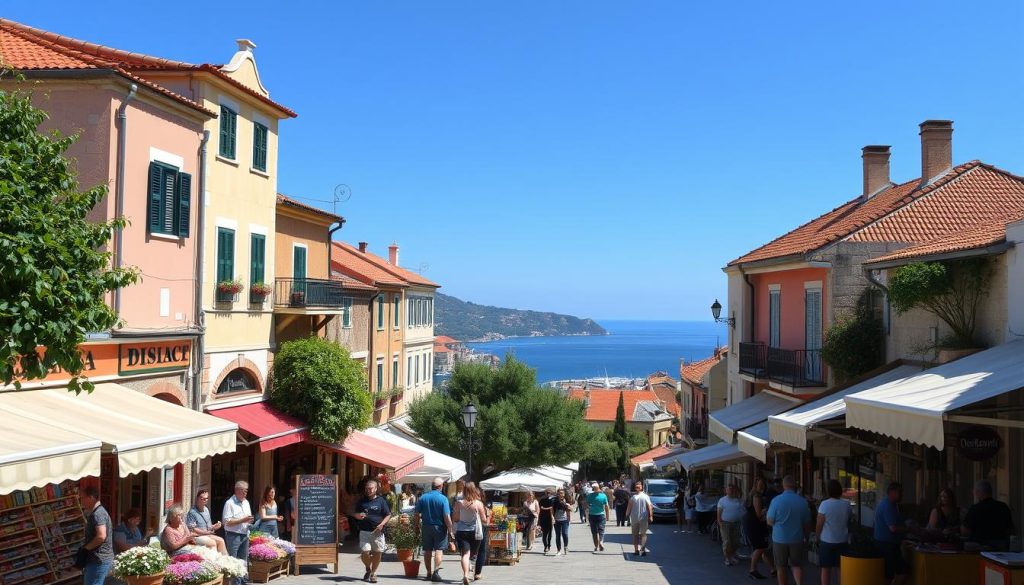Welcome to your ultimate guide for navigating the vibrant business landscape in Croatia. More entrepreneurs are looking at Croatia for business. It’s important to know the market and local customs well.
This guide will give you key insights into the Croatian market. We’ll cover business culture, legal frameworks, and opportunities for foreign investment. It’s all about helping you understand the Croatian business scene.
If you’re thinking of starting a business in Croatia or expanding your company here, this guide is for you. We’ll take you through the steps to establish a successful presence in Croatia.
Introduction to the Croatian Business Landscape
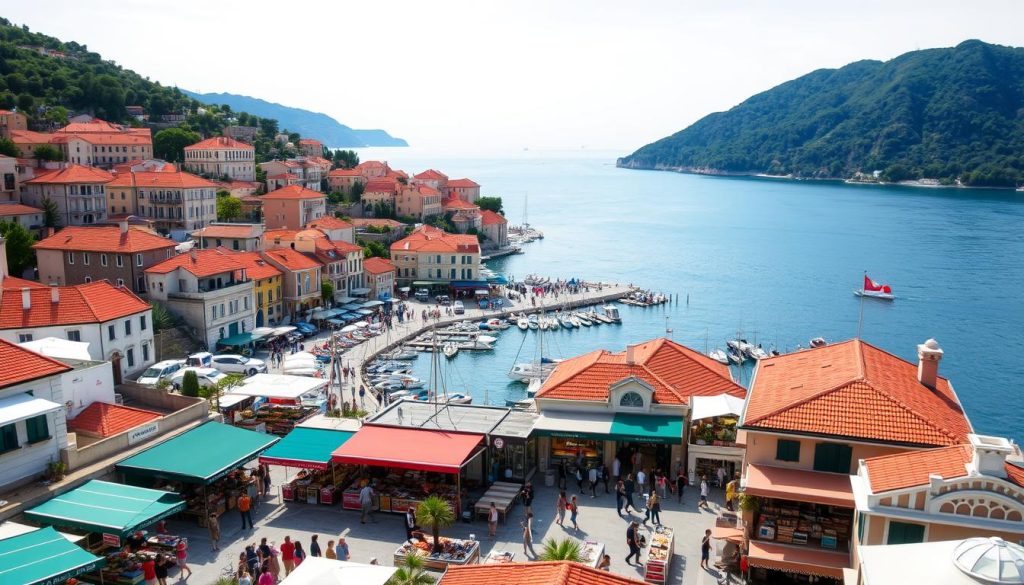
The Croatian economy is full of promise. Since 2013, it has seen steady growth. Tourism, in particular, boosts the GDP, showing the country’s strength.
Experts from the Croatian Bureau of Statistics say there’s a good trend in foreign investments. This shows the economy is doing well.
New industries like IT and renewable energy are catching eyes. They match global trends and Croatia’s aim for sustainable growth. The government is making it easier for businesses to thrive here.
Businesses need to use new tech and skilled workers to reach Croatia’s full potential. The country is working on its infrastructure and rules to support growth and innovation.
Understanding Croatian Business Culture

To succeed in Croatian business, you need to know its unique traits. Building strong relationships and trust is key. Face-to-face meetings are crucial, showing the value of personal connections.
Organisations in Croatia follow a strict hierarchy. This affects how decisions are made and shows respect for those in charge.
Key Cultural Norms and Values
In Croatia, some norms are vital for business etiquette. These include:
- Building personal relationships before talking business.
- Using formal greetings and being polite.
- Being on time is important, but there’s some flexibility in social settings.
- Family ties and local connections play a big role in business.
Communication Styles in Croatia
Good communication in Croatia mixes directness with politeness. Here’s what it’s all about:
- Direct conversations help keep things clear.
- Non-verbal cues like body language and eye contact matter a lot.
- Using formal titles and surnames shows respect at first.
- It’s important to be professional but also warm in your interactions.
Doing Business in Croatia: Key Legal Considerations
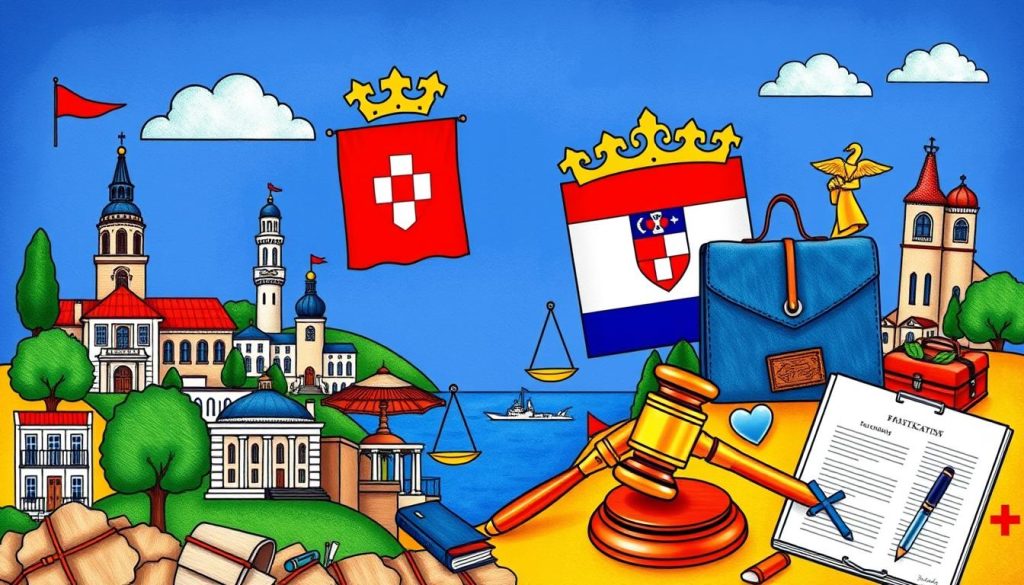
It’s crucial to know the legal setup in Croatia for foreign businesses. They must follow the rules to operate legally and well. This ensures they can succeed in the market.
The Croatian company law explains how to register a business. This includes the documents and applications needed. Foreign investors must understand these rules to meet local laws.
Corporate governance is key in Croatia. It means following the Croatian Commercial Code. This ensures transparency and accountability in the business. Good governance boosts credibility and protects investors.
Intellectual property laws are important for protecting new ideas. Businesses must register trademarks, patents, and copyrights. Knowing these laws helps keep a competitive edge.
Consumer protection laws are also part of the legal framework. Companies must follow these to avoid penalties. This builds trust with customers.
Navigating the Croatian Bureaucracy

Starting a business in Croatia means getting through its complex bureaucracy. You need to know about the key permits and licenses. This is vital for following the rules and doing well in your field. Knowing what documents you need and how to get them is key to a smooth start.
Essential Permits and Licenses
Every industry in Croatia has its own set of permits and licenses. You’ll need:
- Business registration with the Croatian Chamber of Economy.
- Trade licences, often specific to the industry.
- Health and safety certifications, especially for food and manufacturing.
- Environmental permits, if your business affects the environment.
Knowing about these permits helps your business run legally and well.
Taxation System in Croatia
The tax system in Croatia is something to think about. The corporate income tax is 18%, but it’s 12% for smaller businesses. There are also other taxes to consider:
- Value Added Tax (VAT) is usually 25%.
- Profit tax on dividends and capital gains.
- Local taxes from municipalities.
Understanding these taxes and recent changes is important for planning your finances. It helps you stay on the right side of the law and make more money.
Market Opportunities in Croatia

Croatia offers many market chances for both local and foreign investors. Its strategic spot and growing economy make it attractive. The rise of new industries opens doors for innovation and starting new businesses. Knowing about these new sectors in Croatia is key to understanding the market.
Emerging Industries
Several key industries are set to grow in Croatia, following global and local trends. These new sectors in Croatia include:
- Technology and digital services, thanks to a skilled workforce and a growing startup scene.
- Sustainable tourism, focusing on green practices and local experiences.
- Agricultural innovation, with a focus on organic products and sustainable farming.
Investors can use these chances to match current business trends and meet the needs of a mindful consumer base.
Consumer Behaviour Trends
It’s important for businesses to grasp consumer trends in Croatia. Recent studies show a move towards:
- Choosing locally made goods, showing a wish to back home businesses.
- More focus on sustainability, leading companies to adopt green practices.
- More online engagement, with people looking for easy online shopping and services.
By matching products and services with these trends, businesses can find success in this changing market.
Establishing a Business Presence in Croatia

Choosing the right business structure is key when setting up in Croatia. There are many types of business entities, each with its own benefits and considerations. Knowing these options helps entrepreneurs match their goals with the right legal setup.
Choosing the Right Business Structure
Croatia offers several business structures to consider:
- Sole Proprietorship: Great for individuals with small businesses, offering simplicity and full control. However, it means personal liability for business debts.
- Limited Liability Company (LLC): Many entrepreneurs choose this for its limited liability protection. It’s good for small to medium-sized businesses.
- Joint-Stock Company: Best for big ventures, allowing for raising capital through shares. It’s ideal for businesses looking to grow a lot.
When setting up, think about liability, taxes, and your business goals. The Croatian Chamber of Commerce offers great advice. They help entrepreneurs understand the legal side, making sure they make the best choice for their business.
Finding the Right Location for Your Business
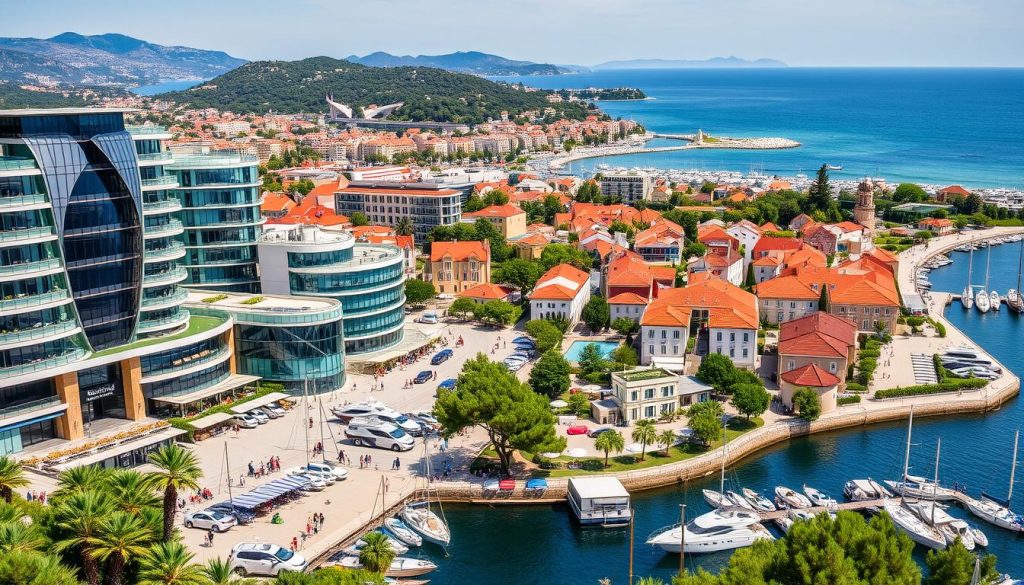
Choosing the right location for your business in Croatia offers many chances. Different areas have their own strengths, like good infrastructure, easy market access, and a skilled workforce. Knowing these can really help your business succeed.
Major Business Hubs
Several top business hubs exist in Croatia, each with its own special features. They cater to different business needs.
- Zagreb: As the capital and biggest city, Zagreb is a key business spot. It has a great transport system, lots of services, and a wide range of talent. This makes it a top business hub in Croatia.
- Split: Split is famous for its strong sea trade. Its coastal spot and growing start-up scene make it lively for entrepreneurs.
- Rijeka: This port city is crucial for trade and logistics. The local government supports business growth, making Rijeka a great choice for businesses in Croatia.
Each major business hub in Croatia has its own benefits. Studying these locations can help make smart business choices. It can also help businesses grow in competitive markets.
Networking and Building Professional Relationships

Networking in Croatia is key for business success. It helps in making professional connections, which open doors to new opportunities. A strong network is essential for understanding the local market and accessing important resources.
Importance of Networking in Croatia
A good network helps in sharing information and forming partnerships. It gives insights into market trends and consumer needs. Working with local professionals builds trust and credibility.
Local Business Events and Associations
Many business events in Croatia are great for networking. Some notable ones are:
- The Zagreb Business Forum
- Dubrovnik Economic Forum
- Business Networking Event by the Croatian Chamber of Commerce
These events offer chances to meet industry leaders and potential partners. Joining local associations also boosts networking. The Croatian Chamber of Commerce and other groups offer support and resources.
Attracting Investment in Croatia

Investment opportunities in Croatia have grown thanks to government support. The Croatian government and local areas offer many incentives. These help make Croatia a great place for investments.
Government Incentives and Support
The Croatian government has set up several programmes to attract foreign investors. Investors can get:
- Financial grants for investment projects
- Tax reliefs, especially in certain areas
- Support through special economic zones with good business conditions
These steps help Croatia stay competitive and show its commitment to investors. The Croatian Agency for Investments and Competitiveness helps promote these efforts.
Foreign Direct Investment Landscape
In recent years, many foreign direct investment projects have started in Croatia. These projects are in areas like technology, renewable energy, and tourism. This growth boosts local economies and creates jobs.
Reports from the Croatian Agency for Investments and Competitiveness show more interest in Croatia. This shows Croatia is a top choice for investors in Europe.
Human Resources and Employment Practices

It’s important to know about human resources and employment in Croatia for businesses. Labour laws in Croatia protect workers and ensure fair workplaces. Knowing these laws helps in hiring well and building good relationships with employees.
Understanding Labour Laws
Labour laws in Croatia cover things like minimum wages, working hours, and benefits for employees. Employers must follow these laws to stay legal and avoid trouble. Key parts of Croatian labour laws include:
- Protecting workers’ rights and benefits
- Rules for holidays and sick leave
- How to handle job losses and ending contracts
Knowing these laws is key to creating good work environments. It helps businesses run well and keeps employees happy.
Recruitment Challenges and Solutions
Many companies struggle to find the right people in Croatia. This is due to skill shortages and cultural differences. To solve these problems, businesses can try:
- Working with local schools to find new talent
- Using online and social media for hiring
- Offering good pay and benefits to attract top talent
These steps make hiring easier and help keep good workers. This makes the whole team stronger.
Marketing Your Business in Croatia

Understanding the marketing scene in Croatia is key for any business looking to succeed. The mix of old and new marketing methods is crucial. With more people online, businesses are turning to digital marketing to connect with their audience and boost their brand.
Effective Marketing Strategies
To make a mark in Croatia, you need to know what locals like and value. Here are some winning strategies:
- Use local influencers to gain trust and credibility with potential buyers.
- Create content that speaks to Croatians, showing off local culture and values.
- Run social media campaigns on Facebook and Instagram to reach younger people.
- Use email marketing to keep in touch with customers and share news and deals.
Digital Marketing Trends in Croatia
The digital marketing scene in Croatia is changing fast, offering new chances for businesses. Key trends include:
- More focus on making websites mobile-friendly as people use their phones more.
- Video becoming a key tool for telling stories and engaging with brands.
- Online shopping growing, so businesses need to improve their online stores.
- Using data analytics to make ads more personal and effective.
Adapting to Regional Differences in Croatia
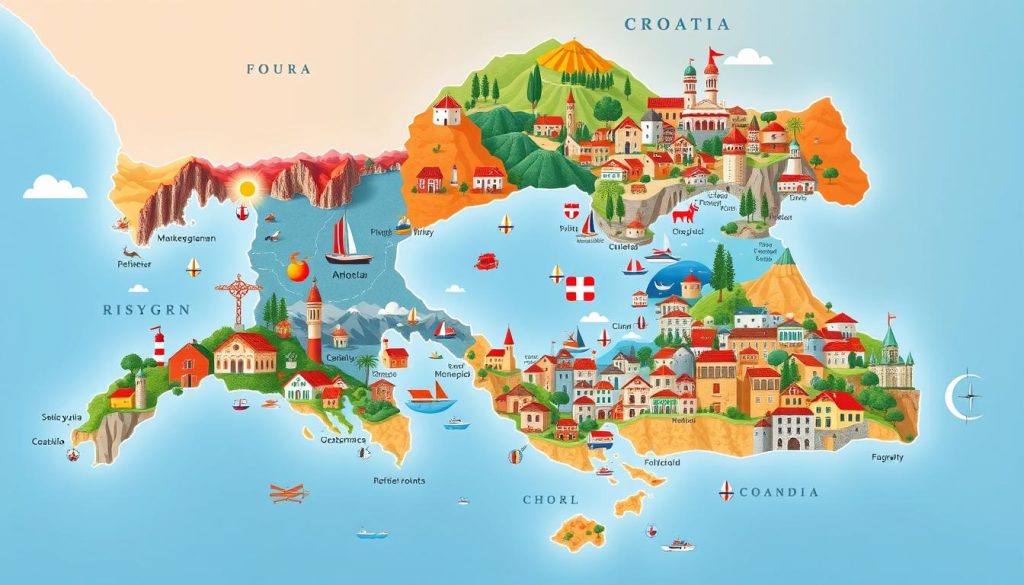
Understanding Croatia’s regional differences is key for businesses looking to succeed. Each area has its own culture and economy. These can greatly affect how a business operates.
To craft a winning business strategy in Croatia, you must adapt to local markets. You need to know how people shop, what they like, and how much they can spend. For example, cities like Zagreb and Split have different needs than rural areas.
When adjusting to these regional differences, consider a few things:
- Cultural norms and values shape how customers interact with your brand.
- Economic conditions affect your pricing and marketing plans.
- Demographics, like age and population density, help decide what products to offer.
Using data and market research can help you understand local tastes. This knowledge lets you tailor your business to meet each area’s specific needs. This approach boosts customer happiness and loyalty.
Understanding Consumer Rights and Protections

Knowing about consumer rights in Croatia is key for businesses. Laws protect consumers and ensure fair trade. Following these laws helps build trust and credibility.
Compliance in Croatia means following rules about how businesses deal with customers. This includes giving clear product info and warranties.
Guidelines for Compliance
Businesses need to know what the Croatian Consumer Protection Agency expects. There are important rules for companies:
- Clear product info, like prices and features.
- Being open about sales terms and guarantees.
- Products must be safe, as Croatian law says.
- Customers should have the right to back out of deals under certain conditions.
Following these guidelines helps businesses stay legal and keep customers happy. They must watch for changes in laws to keep up with compliance.
Challenges and Risks of Doing Business in Croatia

Starting a business in Croatia comes with its own set of challenges and risks. Both local and foreign investors need to think carefully about these. Knowing the potential problems is key to doing well in the Croatian market. This part talks about the main economic and political issues and common problems foreign investors face.
Economic and Political Factors
The business scene in Croatia is shaped by several economic and political factors. These can affect how profitable and stable a business is. Economic ups and downs, like changes in currency value and inflation, can raise costs. Political changes, such as new policies or rules, can also cause uncertainty.
Investors should keep up with the political scene and talk to local people. This helps them deal with these issues better.
Common Pitfalls for Foreign Investors
Foreign investors need to watch out for many pitfalls in the Croatian market. These can stop them from succeeding. Some of the main pitfalls include:
- Not understanding local laws and rules, which can lead to trouble.
- Not seeing how important it is to build local connections, which are crucial for business.
- Not doing enough research on the market, which can lead to bad plans.
- Ignoring red tape that can slow down projects.
By being proactive and tackling these risks, investors can make their businesses run smoothly. This will help them succeed in the Croatian market for the long term.
Resources for Foreign Entrepreneurs in Croatia
For those entering the Croatian market, a wealth of resources exists to provide essential support. Government agencies like the Croatian Chamber of Economy and the Croatian Agency for SMEs, Innovation, and Investment offer tailored support. They help businesses understand regulatory frameworks, funding opportunities, and market entry strategies.
Non-profit organisations also play a key role in fostering entrepreneurship in Croatia. Networks such as the European Enterprise Network and local incubators provide valuable support. They offer insights into local market conditions and help connect with key industry players, boosting the business ecosystem.
Online platforms offer tools for foreign entrepreneurs. Websites, blogs, forums, and social media groups are great for networking and sharing information. By using these resources, foreign investors can better understand the Croatian market, improving their chances of success. Embracing these opportunities is crucial for entrepreneurs aiming to thrive in Croatia’s evolving business landscape.

